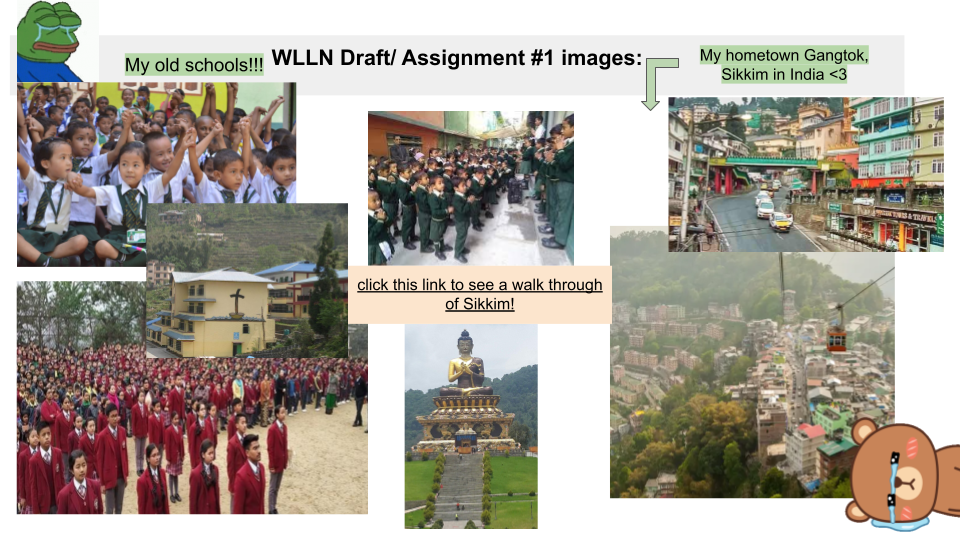WLLN Draft
Tenzin Tsephel
12/4/22
ENG 110: Writing and Rhetoric
WLLN Draft
Growing up in India and making a sudden life changing move to New York at the age of 4 was something I never truly grasped. As a child, I was not really a deep thinker, I was more surface level. I didn’t recognize the seriousness of this life-altering move. Some can argue that I was too little to understand, I think that I definitely could’ve shown more emotion- specifically sadness and maybe even anger, because I would be leaving my family and friends. I excitedly waved goodbye with a fat smile to my childhood best friends/neighbors and my grandparents, not knowing that it would be the last time that I would see the majority of them. My sister is 8 which is 4 years older than me and I saw her cry as we descended down to the LaGuardia airport, while I looked around in awe of the new world we’ve just entered. We moved around in New York 3 times and I went about it as if the course of my life wasn’t changing with each new “home”. Our first home was a tiny one bedroom, one bathroom apartment in sunnyside queens that housed my sister, my dad, my mom and I.
In India, I was bilingual and spoke hindi and nepali. You would think it’s a good thing that a child as young as I was at the time, picked up not one but two languages (that were not primarily spoken in our house) and spoke it fluently. Instead I was made fun of by my peers and had snide comments thrown at me from other family members because I didn’t speak my own language, Tibetan. I’ve been a stubborn child since birth, so these insults didn’t have much effect on me. I would argue back when my friends commented about my lack of Tibetan culture and language. I never made the effort to change myself and learn because I took these comments as an insult instead of as constructed criticism. At times it felt almost as if I was ganged up on and bullied, which only strengthened my resistance to learning Tibetan because I didn’t want to give in and do what they wanted me to do. .
Fast forward to 5 year old Tenzin attending elementary school in NYC, I immediately adapted to American life and quickly forgot both of the languages I grew up speaking. I began learning and primarily speaking in English. Every morning, my mom would walk me to school for the next ⅚ years. My mom and I have always been closer than my dad and I. As those ⅚ years passed by, our conversation grew shorter and shorter due to our language barrier. Eventually it turned from conversation to a few sentences every now and then. When I started middle school, my mom’s English was getting better because she started to work as a housemaid in Manhattan to provide for our family.
In my teens, my ignorance only grew. At the ages of 10-15, I was very selfish. I was only concerned about normal pre-teen/teen girls things – boys and popularity. In school I was funny and loving to all of my many friends, and at home, I barely spoke to my family because I was constantly on my computer/phone. This emotional distance from my family can also be attributed to the language barrier that was previously instilled. During this time period, my family spoke only in Tibetan amongst each other, and when they would speak to me I would understand but only respond in English. I thought the only important language was English, and that I didn’t need to learn my native language.
During conversations with my mom on laundry day,or dinner at home, family outings etc. I would correct my mom and sometimes even laugh at her pronunciations of certain english words. I would speak over her when we’re in the grocery checkout line, or at restaurants because I was afraid of people not understanding her english. Looking back, I have not regretted anything more in life than the way I treated my mom during this time. I failed to understand that i learned English in school alongside kids my age and teachers. I was privileged in the aspect that I had so many resources and was taught at a young age so it’s even easier to learn. My mom on the other hand, had to learn English for her survival and for the betterment of our family.
Once I hit 16, I went to a Tibetan refugee camp in India where I met Tibetans that were born and raised in India. I realized how uncultured I was and I was ashamed to even call myself Tibetan, when I didn’t even know the first thing about my culture. There, I read multiple writings by the Dalai Lama and watched documentaries about Tibet and our painful fight for freedom. I attended conferences, and even met the Dalai Lama in person for a Q&A with my camp. After the month ended, I returned to New York as a new person with a new mindset. When my parents would talk to me, I would respond back in Tibetan and I never made a comment again about my mothers pronunciation. Reading has truly made such a huge impact on my life by giving me knowledge and evolving my mindset. These books on Tibet provided me with a sense of culture and comfort and eventually created my love for reading books on activism and religion. Not only do I feel more educated, but I have genuinely been happier since then. I am now 20 and for the past 4 years I have been educating others on Tibet whenever they ask me about my ethnicity and why I was born in India (and not Tibet). The more people I can educate, my country and our history/culture/language will stay alive.





